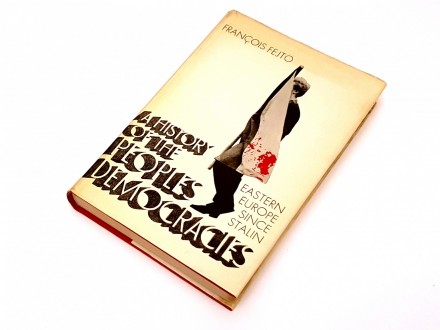A history of the People`s Democracies / Francois Fejto
| Cena: |
| Želi ovaj predmet: | 3 |
| Stanje: | Polovan bez oštećenja |
| Garancija: | Ne |
| Isporuka: | BEX Pošta Post Express Lično preuzimanje |
| Plaćanje: | Tekući račun (pre slanja)
PostNet (pre slanja) Ostalo (pre slanja) Lično |
| Grad: |
Novi Beograd, Beograd-Novi Beograd |
ISBN: Ostalo
Godina izdanja: 1971.
Jezik: Engleski
Autor: Strani
A history of the People`s Democracies: Eastern Europe since Stalin / Francois Fejto
Istorija narodnih demokratija: istočna Evropa posle Staljina
London, Velika Britanija 1971. Tvrd povez, zaštitni omot, engleski jezik, 374 strane.
Knjiga je odlično očuvana.
After the death of Stalin in 1953, a new era began for the Communist countries of Eastern Europe. This book is a study of the reaction against Russian hegemony which followed his death and the subsequent emergence of new liberalizing and nationalistic trends. Part I concentrates on the political development in the People`s Democracies (Albania, Bulgaria,
Czechoslovakia, East Germany, Hungary, Poland, Rumania and Yugoslavia) and analyses the significance of the Hungarian revolution of 1956, the Warsaw Pact, Yugoslav revisionism, China`s rise to power and the Moscow-Peking conflict, the fall of Kruschev and the `springtime of Prague`.
Part II covers domestic politics, economic reforms, agriculture and planning, development of social structures and the lure of the West, with a sharp look at the discontent of the intellectuals and the confrontation of Marxism with science, education, the Church and youth. A postscript on the recent events in Poland brings the reader up to date.
Frangois Fejtö was born in Hungary in 1909 and became one of the country`s leading journalists. He joined the circle of anti-fascists who opposed the alliance with Hitler`s Germany, and became co-editor of the socialist journal Nepszava and the literary review Szep Szo. Eventually he was forced to leave Hungary and he took refuge in France where for the last twenty years he has been correspondent in charge of foreign affairs for Agence France-Presse.
He is one of Europe`s leading analysts of Communist affairs and is the author of several books on Eastern Europe. His erudition, energy and searching regard for truth compel the reader`s attention.
Sadržaj:
Introduction
PART I: The Events
1 The New Course
2 Relations between the U.S.S.R. and the Socialist Countries
3 The Twentieth Congress of the C.P.S.U.
4 The Eastern Leaders and De-Stalinization
5 The Revolutions of October 1956
6 A Holy Alliance against Revisionism and National Communism
7 The Moscow-Peking Conflict and the People`s Democracies
8 Liberalization under Khrushchev
9 The People`s Democracies after Khrushchev
10 The Second Yugoslav Revolution
11 The Czechoslovak Tragedy and its Implications
PART II: Structures and Tendencies
12 Contradictions within the Communist System
13 The National Revival
14 The Lure of the West
15 Forces of Cohesion and Community Institutions
16 Development of Internal Political Structures
17 Reforms in Planning and Economic Management
18 The Development of Social Structures
19 Cultural Development: The Breakdown of Ideology
Prospects
Epilogue: After Prague and Postscript on Poland
Notes
Index of Persons
General Index
kako da se izvrši uplata,
kada i gde je lično preuzimanje ako ga nudite i sl.
Jednom uneti uslovi prodaje su isti na svim predmetima.č
Predmet: 63236541







